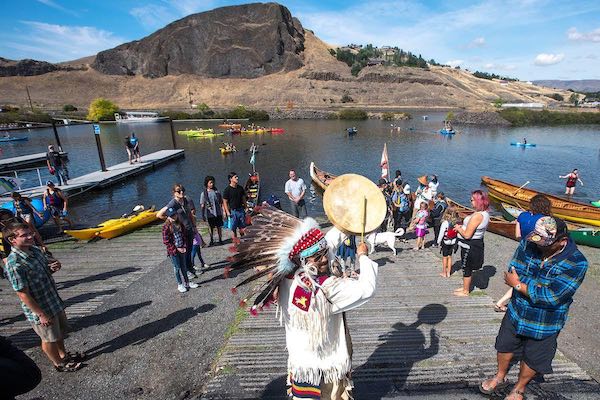forum
library
tutorial
contact

Rendezvous for the Rivers
by Kerri SandaineLewiston Tribune, September 22, 2019, 2019
|
the film forum library tutorial contact |

|
Rendezvous for the Riversby Kerri SandaineLewiston Tribune, September 22, 2019, 2019 |
Snake River event puts focus on local waterways, issues surrounding them
 A colorful fleet of canoes and rafts floated along the Snake River on Saturday morning in support of restoring wild salmon, honoring tribal treaty rights, protecting orcas and removing dams.
A colorful fleet of canoes and rafts floated along the Snake River on Saturday morning in support of restoring wild salmon, honoring tribal treaty rights, protecting orcas and removing dams.
Now in its fifth year, the Nimiipuu River Rendezvous drew hundreds of advocates to the Lewiston-Clarkston Valley for a two-hour journey on the water from Asotin to Hells Gate State Park. Several tribes were represented at the event, along with salmon and orca activists, anglers, river enthusiasts and students.
"Every paddle you are pulling is a prayer for the fish, a prayer for the environment," said Gary Dorr, of Moscow. "We are grateful for your participation. This keeps getting better every year."
Dorr, 52, has been involved with the event, formerly known as the Free the Snake flotilla, since it began.
"What we did here today is about the rivers -- the Columbia, Snake and Clearwater," Dorr said. "No matter where you're from, this water is important. If you don't stand up for your water now, they're going to take it later."
Dressed in traditional regalia, Charleton J. C. Nightwalker, 41, of Tacoma, performed a prayer song prior to the launch of canoes, rafts and boats at Asotin. When the flotilla reached Hells Gate State Park, he was on the shore to greet the group.
Elder Luci Simpson of Lapwai blessed all the participants in a sacred circle with an eagle feather, which is "a direct conduit to the Creator."
"I like the coming together of Indian and non-Indians to work toward the same common goal," Simpson said. "We're all here to get our salmon back, get our orcas back and protect our waterways."
Restoring the lower Snake River by removing four dams is essential to return salmon and steelhead to healthy, harvestable numbers, said Julian Matthews, a 61-year-old Pullman resident and enrolled tribal member. The salmon are already endangered and will become extinct if things don't change, he said.
"We need a longterm fix," Matthews said. "These rivers need to flow freely, and the four lower Snake River dams were designed to be breached when they were installed."
Joseph Bogaard, 53, of Seattle, was with the Save our Wild Salmon group that worked with the Nez Perce Tribe to help organize the event.
"This is a really important opportunity to visit the Snake River and be hosted by the Nez Perce Tribe," Bogaard said. "We are here to educate people about what's at stake. The science is pretty strong that what we've been doing isn't working. Restoring the lower Snake River is a key piece of restoring salmon in the Columbia basin. As advocates, we are interested in working with policy makers and stakeholders to make sure we're solving problems and no one gets left behind."
Thumbs Heath, 58, of Salmon River, said he was drawn to the rendezvous because of his concerns about how man is harming nature.
"I am here because I love our mother," Heath said. "She has cancer. We are that cancer."
A Twin Harbors Waterkeeper from western Washington said her goal was to bring attention to orcas. More salmon is essential to protect starving orcas from extinction, she said.
"We think Gov. (Jay) Inslee's Orca Task Force is not doing enough to save the orcas," said Lee First, 62, of Aberdeen. "We need a lot more salmon. (Millions) die behind these dams every year. "
Nightwalker, an inherent Palouse chief, said his ancestors were wrongfully removed from their encampments on the banks of the Snake River when the dams were built. Tribes can no longer access their waterways and ancestral sites, and treaty rights are being violated.
"We are no longer able to practice our culture and traditions on our own lands because of our relocation," he said. "On the day an archaeological team removed the bones to assist in the building of the dams, our people ceased to be able to continue as we always had."
Nightwalker said he's delivered the same message to politicians in Washington, D.C., and at the United Nations.
"The salmon and orca, like the Palouse people, are in danger of becoming extinct, unless the dams are removed to increase their numbers, just as the removal of the Elwha River Dam in western Washington has benefited the population and health of the chinook salmon," he said.
"There is no reason for the dams on the Snake River to remain, and the agreement created 50 years ago has expired."
Related Pages:
Breach the Snake Dams by Patrick Robichaud, Moscow-Pullman Daily News, September 28, 2017
learn more on topics covered in the film
see the video
read the script
learn the songs
discussion forum
